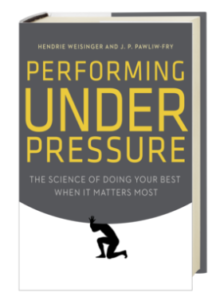
Top Emotional Intelligence Speaker
Why Book this Speaker: Dr. J.P. Pawliw-Fry is a top emotional intelligence keynote speaker, leadership thought leader, peak performance expert, and co-author of the New York Times bestseller, Performing Under Pressure. His work with leaders from Fortune 500 companies, U.S. Marines, Olympic athletes, NBA, and NFL teams has provided him with considerable opportunities to test his science-based tools in environments of high pressure.
Traveling From: IL, Canada
Fee Range: $30,000 – $40,000
Emotional Intelligence (EQ) Thought Leader, Leadership, Performance and Change Expert
Dr. J.P. Pawliw-Fry is an emotional intelligence keynote speaker, leadership thought leader, peak performance expert, and co-author of the New York Times bestseller, Performing Under Pressure. As a speaker and consultant, J.P. challenges groups to think differently about human behavior, leadership and how to manage the pressure that is overtaking so many organizations and individuals today.
YOU WON’T WIN IF YOU CAN’T KEEP YOUR BEST PEOPLE
LEVERAGING THE SCIENCE OF EMOTIONAL INTELLIGENCE
With 40-70% of people contemplating leaving their jobs, the challenge of retaining your best and brightest has never been more important.
But you won’t keep and engage them if you rely on pay, benefits or cool job titles.
It’s been a challenging two years and people are getting burned out and overwhelmed, yet they are now facing increased uncertainty, change, and the pressure to deliver with limited resources. What they need to be successful in this environment is a manager who is equipped with the skills of Emotional Intelligence (EI). A manager who, in times of stress, can tune in to the needs of their directs and help them grow, be resilient and productive.
Unfortunately, at the very time your people have this critical need, pressure is pushing your well intentioned managers to become more command and control, and less connected to their people, causing your best to consider greener pastures. It doesn’t have to be this way.
In this powerful virtual or live experience, your managers and leaders will learn how to:
Your team is feeling burnt out. They feel overwhelmed with too much to do and have fewer resources because of the Great Resignation. They are feeling anxious and are concerned about their lives becoming too busy and frantic again. Sometimes their worry doesn’t have a specific focus, it simply has become an all- encompassing, global anxiety. Without concrete skills to manage these challenges, their brains form negative behavior patterns and bad habits that negatively affect their mental and emotional health, and their performance.
It doesn’t have to be this way.
The goal of this program is to give individuals insight and tools to manage anxiety and stress in all parts of their life. Anxiety can be defined as a feeling of worry, nervousness, or unease about something with an imminent or uncertain outcome. We all feel some sort of anxiety and stress on a spectrum, and it can vary in intensity and level of disruption of our life.
The good news is that there is a burgeoning science of how to manage anxiety and build resilience that anyone can learn. It starts by becoming a ‘student of human behavior’ – understanding how the brain responds to pressure and uncertainty and then learning concrete skills and strategies to manage emotions and the mind more effectively.
In this interactive program, your people will learn:
Your people are burning out. After a long, difficult time during the pandemic, they are feeling overworked and underappreciated. This is causing many to question staying in their current position. The most important thing your organization can offer them is an environment that is strong in empathy. When an individual doesn’t feel like they have a voice, doesn’t feel valued or doesn’t know where they stand with their manager, they start to disengage, lose energy and contemplate leaving. This is especially true when they face uncertainty and the challenges of remote/hybrid work.
Equipping your managers (and your whole organization) with empathy not only helps people who are struggling to get though a tough time, it also puts them on the road to achieving great things together. Something they truly desire.
In this powerful virtual program, your people will learn:
Our research has found that most people are relatively effective at getting to 92% of what they want to say in a feedback conversation. But when they get to the last 8% of what they really want to say, the hardest part of the feedback they want to give, the part of the conversation that has consequences for the other person, they sense the potential emotional impact this feedback might have, and they back off and avoid giving this important information.
This creates significant challenges for the other person: not only do they not know how where they stand, which increases their anxiety, but they don’t improve and get better. Worse, they feel less psychologically safe and emotionally connected, which increases the chance they will leave their job, not helpful when keeping the best and brightest is becoming the most important issue for organizations today. It doesn’t have to be this way.
The goal of this program is to give your people the insight and tools to manage their emotions to get to the Last 8% of what they want to say in a feedback conversation. The good news is that there is a burgeoning science of how to give and receive feedback that anyone can learn. It starts by becoming a ‘student of human behavior’, understanding the brain under pressure, and learning the concrete skills needed to give feedback in a way where the other person can hear it.
In this powerful program, your people will learn:
Your people are facing the most intense challenge of their careers, yet most continue to rely on their IQ and technical skills to manage through. It’s not enough.
To survive, your organization needs to be agile and see opportunities where others do not. Your team needs to learn how to work effectively with others who are, themselves, under pressure themselves.
In this powerful program, your team will learn:
“People change what they do less because they are given analysis that shifts their thinking than because they are shown a truth that influences their feelings.” – John Kotter
The usual approach to change does not take into consideration the human brain and its neurological realities. The brain’s primary hardwired mission is ‘first, keep alive.’ When change is coming the brain senses personal danger and all too often its built-in responses are to trigger emotions that cause people to resist and prevent change. This is the major reason why over 80% of change efforts fail.
In this program, you will:
Most people struggle to have the impact they want to have because they lack the tools to confront the more difficult conversations they face. Avoiding difficult conversations, decisions, and tasks, what we call Last 8% Situations, not only handicaps an organization’s ability to adapt and win but disengages their most important resource, their people.
Now is not the time to play safe. As you face a new post-pandemic normal, tough decisions and conversations will have to be made about how you work (and where) in order to realize your organization’s success.
In this powerful virtual program, your people will learn specific tools to:

Have questions about booking this speaker or finding a speaker? Fill out the form below. We’re happy to help.